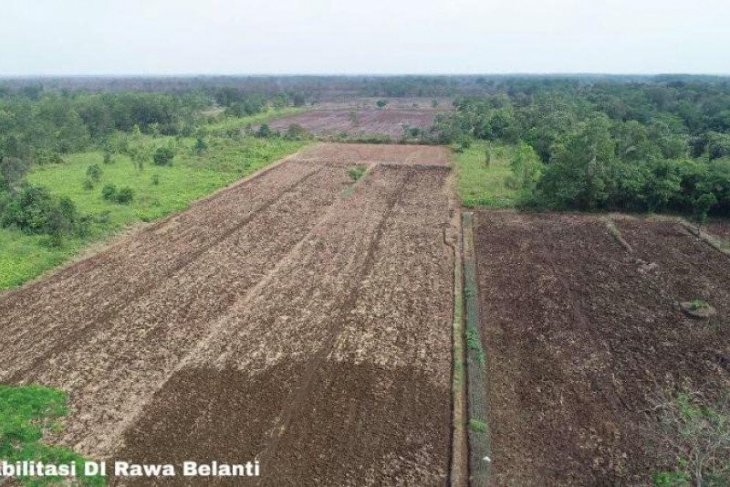Live Streaming
Program Highlight
Company Profile
June
Bappenas Endorses Budget Planning to Lower Impacts of COVID-19
Written by Ani Hasanah
Minister of National Development Planning/Head of the National Development Planning Agency (PPN / Bappenas) Suharso Monoarfa said in Jakarta on Wednesday. (24/6/2020). ANTARA/Dewa Wiguna.
The Indonesian Ministry of National Development Planning/National Development Planning Agency (PPN/Bappenas) has encouraged local governments to strengthen the budgeting planning system, or "SEPAKAT," to reduce the socio-economic impacts of the COVID-19 pandemic.
"The evidence-based planning system at the regional level should be strengthened," Minister of PPN/Bappenas Suharso Monoarfa stated in Jakarta on Wednesday.
Monoarfa called for adopting a different approach through Sepakat, an evidence-based application, implemented at the provincial and village level to handle the social and economic repercussions of the coronavirus pandemic.
Monoarfa remarked that the SARS CoV-2 virus outbreak not only affected public health but also led to a rise in unemployment.
The pandemic has made it difficult for people to access basic services.
"Thus, eventually, new poor and vulnerable populations have emerged. The vulnerable population becomes poor, while the poor become poorer," he remarked.
With this planning system, the impact of the coronavirus pandemic can be handled in a more precise and efficient manner so as to lower the socio-economic impacts.
Earlier, the minister had stated that the poverty rate could be reduced to a single-digit figure, with data for September 2019 showing that 24.79 million Indonesians lived in poverty, or equivalent to 9.22 percent of the population.
However, in the wake of the COVID-19 epidemic, poverty is expected to rise while the unemployment rate is projected to reach 8.1-9.2 percent.
The government’s intervention is expected to lower the impact so as to prevent the poverty rate from not jumping higher.
SEPAKAT, an Integrated System for Poverty Planning, Budgeting, Analysis and Evaluation, was released by Bappenas in 2018, and until now, only 129 districts and cities and seven provinces in the country have utilized it.
Monoarfa explained that SEPAKAT is the register of social compilation covering 100 percent of the population by digitizing village monographs whose integrated data collection and analysis of the budgeting planning, monitoring, and evaluation processes were conducted in an inclusive and pro-poor manner.
In the National Medium-Term Development Plan (RPJMN) 2020-2024, the government targets that all provincial, district, and city governments will utilize the system.
"In the context of recovering from the socio-economic impacts of the COVID pandemic, SEPAKAT can support regions to formulate recovery strategies and policies through analysis of the socioeconomic indicators," he added. (ANTARA)
June
Government's Intervention to Curb Increase in Poor Population: Bappenas
Written by Ani Hasanah Director for Poverty Eradication and Social Welfare of the National Development Planning Agency (Bappenas) Maliki. (ANTARA/Dewa Wiguna/sh)
Director for Poverty Eradication and Social Welfare of the National Development Planning Agency (Bappenas) Maliki. (ANTARA/Dewa Wiguna/sh)
Governmental intervention to disburse social assistance amid the COVID-19 pandemic will curb the increase in the poor population, with the newly poor expected to reach 1.2-2.7 million, National Development Planning Ministry/National Development Agency (Bappenas) stated.
"The government's intervention will not only contain the rise in the poor population but also usher in economic recovery. It can limit the increase in the number of poor to only some 26 million to 27.5 million," the Agency's Director for Poverty Eradication and Social Welfare Maliki stated during a webinar in Jakarta on Wednesday.
The poverty rate after the COVID-19 pandemic is expected to lie in the range of between 9.7 to 10.2 percent of the total population in the 2020 outlook.
Without the government's intervention, the number of poor could reach 28.7 million, or 10.63 percent of the total populace, under the worst-case scenario of economic growth at minus 0.4 percent in 2020, increasing 3.9 million as compared to the poverty rate in September 2019 at 9.22 percent of the population, or 24.79 million people.
The government's intervention covered various programs including the distribution of essentials, expansion of the Family Hope Program (PKH), Cash Transfer Assistance (BLT) sourced from the Village Funds, and cash social assistance from the Social Affairs Ministry.
The budget allocated for these social security programs had reached Rp203.9 trillion, of the total Rp695.2 trillion of the COVID-19 handling budget.
The government has encouraged local governments to utilize the system of budget planning, monitoring, evaluation, and integrated poverty analysis, or "Sepakat," to obtain a more adaptive budget planning based on the evaluation of the social and economic impacts of the COVID-19 pandemic.
Hence, region-wise budget planning could be made on the basis of the target and data of beneficiaries by name and address.
"Sepakat" was released by Bappenas in 2018 using the digitized village monograph. As of now, the system has only been applied in 129 districts and cities and seven provinces in the country.
In its 2020-2024 National Medium-term Development Plan, the government has targeted the system to be used in all provinces, districts, and cities across the country.
"With Sepakat, in future, we can reduce the poverty rate, and at the end, we can achieve zero poverty in 2024," he added. (ANTARA)
June
PUPR Ministry to Remodel Irrigation System in Planned Food Estate
Written by Ani Hasanah
Land rehabilitation in Rawa Belanti, Central Kalimantan. ANTARA/Doc. Ministry of Public Works and Public Housing/sh
The Indonesian Public Works and Public Housing (PUPR) Ministry has decided to redesign the irrigation system in the planned Food Estate area in Central Kalimantan, Minister Basuki Hadimuljono stated in Jakarta on Wednesday.
"This year, the PUPR Ministry will redesign the irrigation network in the 165 thousand hectares of the Food Estate area in Central Kalimantan," Hadimuljono remarked during a working meeting with Commission V of the House of Representatives.
The government intends to develop the food estate in Pulang Pisau District in Central Kalimantan Province by using alluvial soil at the site of the failed mega-peatland development project (PLG).
"The potential area reaches some 295,500 hectares. Some 165 thousand hectares of the area had already been prepared as an irrigated paddy field, of which only 85,500 hectares was utilized as productive land. We want to intensify production in 57,200 hectares (ha) of the productive land," he expounded.
The remaining 79,500 ha of the 165 thousand-ha of potential land had been abandoned and covered in bushes.
"Last week, we had visited the area along with wetland experts. The 59,200 hectares of productive land had only produced 1.7-2.9 tons of rice per hectare," he pointed out.
The minister opined that the low productivity was owing to an inefficient irrigation system that hindered the flow of water and optimal fertilizer absorption coupled with recurrent flooding in the swampy area.
"Next year, we will involve state enterprises and the Defense Ministry. Defense Minister Prabowo Subianto had once stated that food estate is a non-military defense," he affirmed.
Hadimuljono highlighted the significance of food resilience as part of the non-military defense. To this end, the defense minister will mobilize youth, with expertise in the fields of computer and agriculture.
The PUPR Ministry had earlier targeted to revive 165 thousand hectares of land as a food estate in Central Kalimantan during the period from 2020 to 2022 in a bid to realize national food resilience.
President Joko Widodo has tasked the ministry with developing the food estate that is projected to become a new food barn outside Java Island. (ANTARA)
June
Police Map out Potential Security, Public Order Issues in 2021
Written by Ani Hasanah
Deputy Chief of Indonesian Police Commissioner General Gatot Eddy Pramono. (ANTARA/ HO-Polri)
Indonesia's National Police have mapped out security and public order issues to potentially encumber the nation in 2021, including those linked to the socio-economic impacts of the ongoing global novel coronavirus disease (COVID-19) pandemic.
"The socio-economic impacts of the coronavirus disease pandemic potentially affect security and public order in communities across Indonesia," Deputy Chief of National Police Coms. Gen. Gatot Eddy informed legislators in Jakarta on Wednesday.
Of the security and public order issues to potentially impact Indonesia, Eddy has estimated a spike in radicalism, intolerance, and demonstrations that may disrupt national stability and security.
Drug trafficking and smuggling, corruption, cybercrimes, and conventional crimes have also become real threats to Indonesia in 2021, he remarked during a hearing session with members of the House of Representatives' (DPR's) Commission III overseeing legal affairs.
The police also placed social conflicts and hoodlumism-spurred acts on the list of threats to the country's security, he noted, adding that certain criminals were capitalizing on the swift developments in digital technology to commit crimes.
In 2021, he remarked, Indonesia will host several international events, including the MotoGP Indonesia 2021, U-20 World Cup, National Games (PON), Bali's Asia Pacific Summit and Forum, Asia Conference and Exhibition, and Global Magellans Network Cities. (ANTARA)


